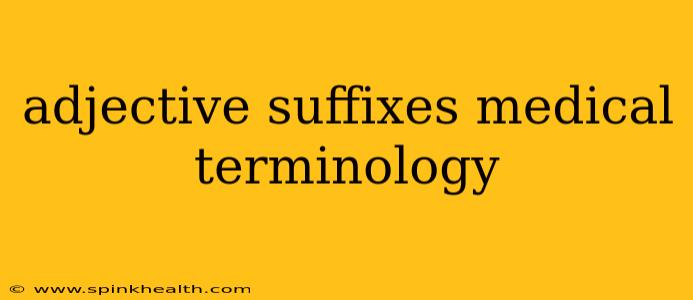Decoding the Language of Medicine: Understanding Adjective Suffixes in Medical Terminology
The world of medicine is a complex one, filled with specialized vocabulary that can seem like a foreign language to the uninitiated. But beneath the surface of daunting terms lies a fascinating system of prefixes, suffixes, and root words that, once understood, unlock the meaning of even the most complicated medical expressions. Today, we'll delve into the captivating world of adjective suffixes in medical terminology, exploring how these tiny additions dramatically alter the meaning of words and paint a clearer picture of a patient's condition.
Imagine yourself as a medical detective, piecing together clues from a patient's chart. Each medical term is a piece of the puzzle, and understanding the suffixes is like having a secret decoder ring. Let's unravel some of the most common ones:
-al, -ar, -ary, -ic, -ous: Common Adjective Endings Indicating a Relationship
These suffixes often indicate a relationship to something, a characteristic of something, or belonging to something. They're workhorses in medical terminology, transforming nouns into descriptive adjectives.
-
-al: Think "pertaining to." For example, abdominal means pertaining to the abdomen. Similarly, neural refers to the nerves, cardiac to the heart, and cranial to the skull.
-
-ar: This suffix also often signifies "pertaining to." Consider ocular (pertaining to the eye), vascular (pertaining to blood vessels), and pulmonary (pertaining to the lungs).
-
-ary: Similar to the others, coronary (relating to the heart’s arteries) is a prime example. It paints a detailed picture of where a medical concern might be located.
-
-ic: This suffix is incredibly versatile. Hepatic means pertaining to the liver, gastric to the stomach, and psychic to the mind.
-
-ous: This signifies a condition or quality. For example, virulent describes something highly infectious or toxic, while anxious denotes a state of worry and unease (though frequently used in everyday language, it also holds a place in medical contexts related to mental health).
What are some examples of adjective suffixes in medical terminology that describe a disease or condition?
This is a fantastic question, delving deeper into the diagnostic power of these suffixes. Often, a single suffix can dramatically change the meaning of a term, suggesting the nature of a disease or condition. While not strictly adjective suffixes in the grammatical sense, several suffixes create adjectives that describe a disease or a condition. Let’s look at a few examples:
-
-emia: This suffix denotes a condition related to the blood. Anemia signifies a deficiency of red blood cells, while leukemia refers to cancer of the blood-forming tissues.
-
-itis: This universally understood suffix indicates inflammation. Appendicitis is inflammation of the appendix; bronchitis, inflammation of the bronchi; and arthritis, inflammation of the joints. It’s a quick way to understand the nature of the ailment.
-
-oma: This suffix indicates a tumor or swelling. Lipoma denotes a fatty tumor, while melanoma points to a tumor of the pigment-producing cells of the skin (melanocytes). The context, of course, is key in determining the benign or malignant nature of the tumor.
How do adjective suffixes help in understanding medical diagnoses?
The beauty of these suffixes lies in their precision. They provide a concise and efficient way of describing conditions, enabling medical professionals to communicate clearly and effectively. For instance, knowing that "-itis" signifies inflammation allows you to quickly understand the nature of a disease like "tonsillitis" even if you're not familiar with the specific organ in question. The combined knowledge of prefixes, roots, and suffixes allows you to build a complete understanding of the medical term and its clinical implications. Therefore, mastering these suffixes becomes a powerful tool for any medical professional (or informed patient) eager to navigate the world of medical terminology.
Are there any resources available to help me learn more about medical terminology?
Absolutely! Numerous resources can aid in learning medical terminology. Medical dictionaries, online courses, and textbooks dedicated to medical terminology are widely available. Many websites and apps offer interactive learning modules to help you master these complex terms. Begin with the basics, understanding the fundamental building blocks (prefixes, suffixes, and roots) before tackling more complex terms. The more you learn, the more you’ll grasp the beauty and the inherent logic behind the language of medicine.
By understanding these adjective suffixes, you're not just memorizing vocabulary; you're developing a deeper understanding of medical concepts. It's a journey of discovery, empowering you to decipher the complex language of medicine with increasing confidence. This knowledge is not only valuable for healthcare professionals but for anyone seeking to understand their own health and medical records better. It's a language worth learning, one word at a time.

